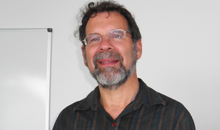Daniel Miller
Why did you choose the inhabitants of Trinidad and Tobago for your study on Facebook?
It's a small community of just over a one million people. They are an intelligent people with a high level of education. Plus, I know the country well, having done other studies there.
What was your methodology?
My methodology is to not have one. In any case, it's very important to me that, as well as an online study, there is also fieldwork. In addition to spending many hours on FB, I also spoke to people face to face.
The book tells the story of a couple who got divorced because of FB. Is this social network really so important that it can make changes in our personal lives?
Yes, FB is changing the lives of many people. There are people who have built a relationship thanks to FB, and there are others who have separated because of it, like the couple I talk about in the book, who got divorced because the wife became over jealous of the female friends her husband had on FB. I also describe the case of an extremely shy man who, thanks to FB, meets a girl, and they end up getting married.
"With Facebook, we've gone back to village life"
You say Facebook is different to the Internet.
Without wanting to discredit the prestigious Manual Castells, Facebook is the complete opposite of the Internet. In FB you feel like you're part of a community, for both the good and the bad things, while the Internet fosters anonymity. The Internet is not a community as such, that is, it's not a small group of people living together where everybody knows everything about everyone else, where there's gossip, where, in the end, everything comes out...You say Facebook is different to the Internet.
So much so that there are people on Facebook who feel the pressure of living in a small village. One boy told me about how he felt pressured because his cousins wanted him to play with them on Farmville and he didn't know how to say no.
It's like going back and living as our grandparents did...
In reality, FB is a deeply conservative force. We spend time interacting with childhood friends, ex-workmates, distant cousins... All the people we had lost contact with come back into our lives. And even though we spend a lot of time in front of the computer, it's not an individualistic behaviour, quite the opposite.
Facebook + teenagers = Danger?
Not at all. I think this has been much exaggerated. Facebook does not represent a real danger for teenagers. It's true that there are 600 million people on FB, and in a place with so many people, anything can happen. I think that journalists have exaggerated the few cases of stalking that have occurred, and while there have been cases, it's not true that it's the medium that is facilitating this. It's just that, as parents, we have a natural instinct to want to control our children, wherever they are...In this study, I have seen that FB is a good communication tool between parents and children: the parents get a more realistic idea of who their children are, and conversations take place that would not have occurred otherwise. I believe that parents and their children have become closer, that a more mature relationship has developed.
"Too much importance has been placed on privacy"
What do you think about the criticism of Facebook's low privacy?
The press talks a lot about the privacy problems that it says Facebook has, but the concept of privacy has changed. Young users and teenagers are not worried about it. They have no problem with displaying photos and videos.What do you think about the criticism of Facebook's low privacy?
I think too much importance has been placed on this question, while no-one has asked why there are so many Facebook users: because a lot of people feel lonely. Loneliness is a much bigger problem in our society than privacy. The truth is that Facebook gives us what we lack in real life.
In fact, you say that the elderly will be the biggest user group in 30 or 40 years.
Yes, the elderly is the fastest growing group of users. The older people of today don't know how to use a computer, they're not interested, but in 20 or 30 years' time, when we're old, we'll be the main users. Of Facebook or of whatever is the equivalent social network at that time.
Have you seen any evolution in this social network in the two years that you have studied it?
A very significant change is that FB has gone from being just "happy land" to a place where people talk about death, about sad things, etc. Pages devoted to people who have died are starting to appear where family and friends can leave comments. And, from what I have seen, people are more comfortable with talking about death and sad things in this way, informally, than in the traditional way that we express grief.I don't know if this is happening in Catalonia or Spain, but in the Anglo-Saxon FB, this change has occurred over the last two years.
Does the Facebook that you study have anything in common with the FB that helped the revolts in the Arab world?
Yes, FB has created a sense of community in the opponents of the dictatorial regimes and it has been very useful for dissidents living in exile.
After Facebook, what are you going to study next?
The language of webcams interests me, in how people communicate visually. I also plan to carry out a more extensive study on Facebook that includes countries like China, India, Brazil, Turkey, Romania, the UK... My aim is to make anthropology interesting for everybody, using a language that is accessible to everyone.
Press contact
-
Editorial department

